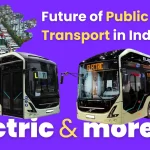E-Bus Travel
In the dynamic world, where sustainable transportation is gradually gaining significance, electric buses (e-buses) are a potential and emerging eco-friendly promising travel solution. These modern sustainable inventions and promising travel sources of the modern age not only help with comfort and noise reduction but also reduce emissions and have a cleaner environmental influence.
Passenger Comfort: Revamping the E-Bus Trip
When you enter an electric bus, the first thing that strikes your attention is the silence. Accounting for the key differences in the construction of e-buses with common buses, their movement with noise reduction thus creates a more comfortable e-bus experience for passengers during a trip with quieter rides.
These features of the hybrid allow for travel with quieter rides usually associated with road trips and instead provide passenger comfort and serenity in the absence of the loud puttering of the diesel engine.
Also, there are enhancements of passenger comfort in electric buses. These are modern marvel travel experience, which boast new generation travel journey that are spacious and ergonomically developed to deliver ride ensuring the passengers comfort on board. Whether it is a daily e-bus travel or a frequent travelling for a few hours, the comfortable e-bus experience is always imprinted with quieter rides.
Environmental Benefits: To travel in a sustainable, friendly manner
Another of the many strategies is that electric bus travel is beneficial insofar as it does not harm the environment. The diesel buses which are familiar in our cities emanate pollutants into the air, which compromise the quality of air and the health of people. Electric buses on the other hand have zero emissions; this dispels exhaust pipe emissions that cause greenhouse gases but the e-bus travel particulate reduced emissions.
Furthermore, the adoption of electric buses sets a precedent for sustainable urban development. Cities investing in e-bus infrastructure demonstrate their commitment to eco-friendly travel and proactive measures to combat climate change. These efforts pave the way for future generations to inherit cleaner, healthier cities where electric buses are emblematic of progress and responsible urban planning.
Community Impact: The Other Advantages of Electric Buses
From the following discussion, the advantages of electric buses are apparent not only from the point of view of personal users. The benefits of electric buses for passenger fleets are based on the principles of a clean environment, as noise levels are significantly reduced due to the utilization of e-bus fleets; hence, the quality of the neighbourhood is greatly enhanced. These sound improvements do not only apply to improving the residential areas but also to making urban experiences more favourable for everyone.
Besides, using electric buses becomes a foundation for a green city in the near future. Adoption of e-bus treatment by cities speaks volumes concerning their readiness and willingness to protect the environment and curb impacts of climate change. For this reason, the e-bus travel advances make it possible for the next generations to embrace healthier urban environments characterized by electric buses.
Economic Advantages: an evolutionary way to travel
In addition to those environmental advantages, electric buses present a strong economic value proposition. With this situation, despite the rather large investments initially needed to acquire the proper e-bus infrastructure and technology, the cost savings over the long term are substantial.
Electric buses consume less power than diesel ones; thus, they will require less fuel in the long run. Further, the maintenance costs of an e-bus are relatively cheaper because there are fewer mechanical parts in an e-bus than in a fuel-operated one since electric engines undergo minimal wearing, which curates eco-friendly travel.
Such efficiencies in cost reduce the expenses for the journey with electric bus travel, which not only makes the journey environmentally friendly but also economically feasible at a later date.
Technological Innovation: Cue the Future Transportation
This is a positive shift for general technological advancement within the transportation field, given electric buses. With improvements in battery technology and electric motors’ power, control, and software, all e-buses have improved performance and are long-range and quick to charge.
The continuous improvement also helps optimize the function of electric buses while at the same time bringing down their costs, thereby making it much more feasible for cities and transit authorities across the globe with eco-friendly travel services. Through the use of electric buses, cities portray themselves as technologically advanced, setting the new benchmark of eco-friendly travel means and crafting an environment-friendly society.
Why Choose electric-bus travel
Electric bus travel is a forward-thinking decision that prioritizes passenger comfort, quieter rides, and reduced emissions. It supports sustainable transportation goals, enhances air quality, and promotes eco-friendly travel practices. Investing in electric buses contributes to a cleaner, healthier environment and a more efficient urban transport system.
Conclusion
In conclusion, electric buses (e-buses) stand as a beacon of progress in the realm of sustainable transportation. Offering passenger comfort, quieter rides, and reduced emissions, these vehicles redefine the commuting experience while significantly benefiting the environment.
From enhancing air quality to promoting eco-friendly travel and fostering economic efficiencies, the advantages of electric bus travel are clear. As cities worldwide continue to grapple with urbanization and environmental challenges, e-buses emerge as a practical and forward-thinking solution. By investing in electric bus infrastructure and technology, communities improve their transit systems and contribute to a cleaner, healthier future for generations to come.






Leave a Reply